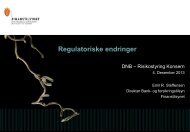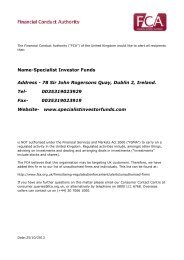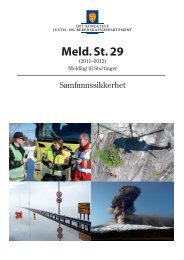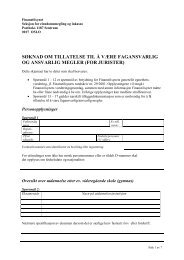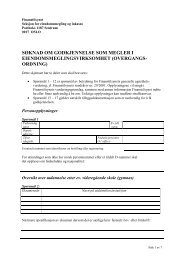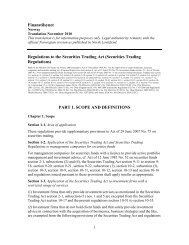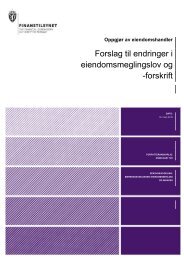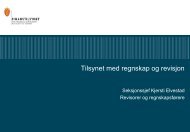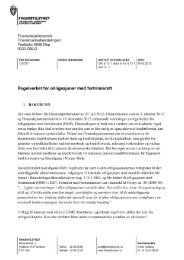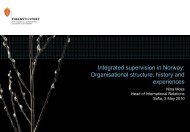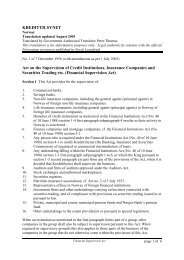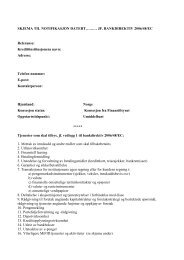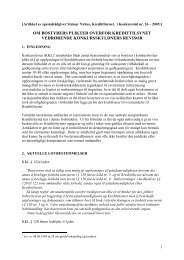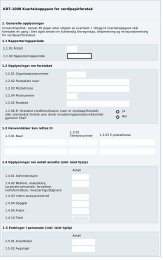Rapport om gjennomføring av AIFMD i norsk rett - Finanstilsynet
Rapport om gjennomføring av AIFMD i norsk rett - Finanstilsynet
Rapport om gjennomføring av AIFMD i norsk rett - Finanstilsynet
Create successful ePaper yourself
Turn your PDF publications into a flip-book with our unique Google optimized e-Paper software.
EN<br />
1.7.2011 Official Journal of the European Union L 174/7<br />
transfer of such liability to that third party, pursuant to a<br />
written contract between the depositary and the AIF or<br />
the AIFM acting on behalf of the AIF, in which such a<br />
discharge is objectively justified, and that the third party<br />
can be held liable for the loss based on a contract<br />
between the depositary and the third party, the<br />
depositary should be able to discharge itself of liability<br />
if it can prove that it has exercised due skill, care and<br />
diligence and that the specific requirements for delegation<br />
are met. By imposing the requirement of a contractual<br />
transfer of liability to the third party, this Directive<br />
intends to attach external effects to such contract,<br />
making the third party directly liable to the AIF, or to<br />
the investors of the AIF, for the loss of the financial<br />
instruments held in custody.<br />
(46) Further, where the law of a third country requires that<br />
certain financial instruments be held in custody by a<br />
local entity and there are no local entities that satisfy<br />
all depositary delegation requirements, the depositary<br />
should be able to discharge itself of liability provided<br />
that: the rules or instruments of incorporation of the<br />
AIF concerned expressly allow for such a discharge; the<br />
investors h<strong>av</strong>e been duly informed of that discharge and<br />
the circumstances justifying the discharge prior to their<br />
investment; the AIF or the AIFM on behalf of the AIF<br />
instructed the depositary to delegate the custody of such<br />
financial instruments to a local entity; there is a written<br />
contract between the depositary and the AIF or the AIFM<br />
acting on behalf of the AIF, which expressly allows such<br />
a discharge; and there is a written contract between the<br />
depositary and the third party which expressly transfers<br />
the liability of the depositary to that third party and<br />
makes it possible for the AIF, or the AIFM acting on<br />
behalf of the AIF, to make a claim against the third<br />
party in respect of the loss of financial instruments or<br />
for the depositary to make such a claim on their behalf.<br />
(47) This Directive should be without prejudice to any future<br />
legislative measures with respect to the depositary in<br />
Directive 2009/65/EC, because UCITS and AIFs are<br />
different both in the investment strategies they follow<br />
and in the type of investors for which they are intended.<br />
(48) An AIFM should, for each of the EU AIFs it manages and<br />
for each of the AIFs it markets in the Union, make<br />
<strong>av</strong>ailable an annual report for each financial year no<br />
later than 6 months following the end of the financial<br />
year in accordance with this Directive. That 6-month<br />
period should be without prejudice to the right of the<br />
Member States to impose a shorter period.<br />
(49) Given that it is possible for an AIFM to employ leverage<br />
and, under certain conditions, to contribute to the build<br />
up of systemic risk or disorderly markets, special<br />
requirements should be imposed on AIFMs employing<br />
leverage. The information needed to detect, monitor<br />
and respond to those risks has not been collected in a<br />
consistent way throughout the Union, and shared across<br />
Member States so as to identify potential sources of risk<br />
to the stability of financial markets in the Union. To<br />
remedy that situation, special requirements should<br />
apply to AIFMs which employ leverage on a substantial<br />
basis at the level of the AIF. Such AIFMs should be<br />
required to disclose information regarding the overall<br />
level of leverage employed, the leverage arising fr<strong>om</strong><br />
borrowing of cash or securities and the leverage arising<br />
fr<strong>om</strong> positions held in derivatives, the reuse of assets and<br />
the main sources of leverage in their AIFs. Information<br />
gathered by c<strong>om</strong>petent authorities should be shared with<br />
other authorities in the Union, with ESMA and with the<br />
European Systemic Risk Board (ESRB) established by<br />
Regulation (EU) No 1092/2010 of the European<br />
Parliament and of the Council of 24 November 2010<br />
on European Union macro-prudential oversight of the<br />
financial system and establishing a European Systemic<br />
Risk Board ( 1 ) so as to facilitate a collective analysis of<br />
the impact of the leverage of AIFs managed by AIFMs on<br />
the financial system in the Union, as well as a c<strong>om</strong>mon<br />
response. If one or more AIFs managed by an AIFM<br />
could potentially constitute an important source of<br />
counterparty risk to a credit institution or other<br />
systemically relevant institutions in other Member<br />
States, such information should also be shared with the<br />
relevant authorities.<br />
(50) In order to ensure a proper assessment of the risks<br />
induced by the use of leverage by an AIFM with<br />
respect to the AIFs it manages, the AIFM should demonstrate<br />
that the leverage limits for each AIF it manages are<br />
reasonable and that it c<strong>om</strong>plies with those limits at all<br />
times. Where the stability and integrity of the financial<br />
system may be threatened, the c<strong>om</strong>petent authorities of<br />
the h<strong>om</strong>e Member State of the AIFM should be able to<br />
impose limits to the level of leverage that an AIFM can<br />
employ in AIFs under its management. ESMA and the<br />
ESRB should be informed about any actions taken in this<br />
respect.<br />
(51) It is also considered necessary to allow ESMA, after<br />
taking into account the advice of the ESRB, to<br />
determine that the leverage used by an AIFM or by a<br />
group of AIFMs poses a substantial risk to the stability<br />
and the integrity of the financial system and to issue<br />
advice to c<strong>om</strong>petent authorities specifying the remedial<br />
measures to be taken.<br />
(52) It is necessary to ensure that the c<strong>om</strong>petent authorities of<br />
the h<strong>om</strong>e Member State of the AIFM, the c<strong>om</strong>panies over<br />
which AIFs managed by an AIFM exercise control and<br />
the employees of such c<strong>om</strong>panies receive certain<br />
information necessary for those c<strong>om</strong>panies to assess<br />
how that control will impact their situation.<br />
( 1 ) OJ L 331, 15.12.2010, p. 1.



